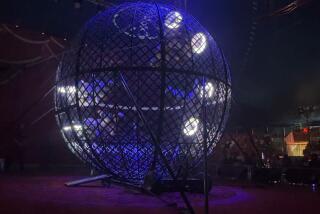Dream Denied Gymnast Who Is HIV-Positive
- Share via
SAN FRANCISCO — Cirque du Soleil, which redefined the circus with its high flying acrobats and artistic contortionists, is struggling to maintain its reputation after firing a gymnast in a case that critics say amounts to a stumble of national proportions.
Matthew Cusick’s dream of performing with the magical Cirque was within tantalizing reach last year. But days before the Maryland resident was to begin a temporary stint on the Russian high bar for Cirque’s Las Vegas show “Mystere” in April, his employer fired him.
The reason, according to Cusick: He is HIV-positive, a medical condition he voluntarily disclosed to his bosses nearly a year earlier when he began a rigorous four months of training with the Canadian company.
Although Cusick, 32, had been cleared to perform as a “healthy athlete” by the company’s doctors, Cirque officials abruptly told him that his role as an acrobatic catcher might subject fellow artists, and even patrons, to risk. Cusick was stunned. Then he went public with his story and San Francisco’s gay and AIDS advocacy groups kicked into high gear.
When the circus performed a recent seven-week stint with its show “Alegria” outside Pacific Bell Park here, the New York-based gay and lesbian civil rights group Lambda Legal -- which is representing Cusick -- helped organize nightly demonstrations.
In late November, the San Francisco Human Rights Commission filed its own complaint -- a rarity for an entity that typically mediates the complaints of others -- alleging that Cirque was violating municipal law by discriminating against a qualified HIV-positive employee.
The commission, which has jurisdiction over Cirque du Soleil because it performs on land leased from the Port of San Francisco, is expected to conclude its investigation later this month. It could fine the circus and bar it from performing on public land here for three years.
Meanwhile, a federal discrimination complaint filed by Lambda Legal in July is pending with the U.S. Equal Employment Opportunities Commission’s Los Angeles District Office, which oversees Nevada. That investigation is also expected to conclude this month. If no settlement is reached, Cusick will be free to sue Cirque.
Cirque officials insist that the company does not discriminate, but have said in interviews and documents that the high-risk nature of aerial acrobatics forced them to fire Cusick. Although HIV-positive athletes are not barred from participating in other high-contact sports, aerial acrobatics present different risks, said director of communications Renee-Claude Menard.
“A decision was made ... that the act ... was too high a risk for someone with an HIV status,” Menard said. “What we evaluate as being the riskiest acts at Cirque for injuries and collisions are the aerial acts, especially a catcher position. We believe that 20 years of experience in this area are enough for us to determine risk.”
But supporters who have rallied to Cusick’s side -- among them internationally known athletes, AIDS experts and a growing list of advocacy organizations -- say the circus is decades out of step with medical reality, let alone the federal Americans with Disabilities Act.
In the more than two decades since HIV and AIDS have swept the globe, there has been no known case of transmission via a sports injury, they say, and routine precautions when dealing with injuries can prevent infection. The circus’ actions against an employee who had no legal obligation to disclose his HIV status could also damage efforts to de-stigmatize the disease, these experts say.
“It really throws us back 20 years,” said Eric Ciasullo, chairman of the board of the National Assn. of People With AIDS and administrator of a San Francisco program for people with HIV and AIDS who are seeking to re-enter the workforce.
“It’s preposterous to think that Matthew poses a threat to people in the audience, let alone his fellow performers. Is he going to cut himself and then hurl the blood into the eyes of people in the front row?” Ciasullo said. “We’re dealing with a company that, for whatever reason, is supplanting their own bad common sense for medical science.”
Lambda Legal AIDS Project Director Hayley Gorenberg, who is representing Cusick, said she had examined sports medicine policies, including those of the National Collegiate Athletic Assn., the American Academy of Pediatrics, the U.S. Olympic Committee and the World Health Organization.
“They all come to the same conclusion: There is no reason, medical or scientific, to exclude HIV-positive athletes from contact sports, and there is no reason to mandate testing,” she said. “It’s a pretty straightforward violation of the law.”
Cusick took his first tumbling class at age 5 and began training as a gymnast at 16. He coached advanced gymnastics from 1987 to 2001. But career opportunities for gymnasts to continue honing their craft are rare. Cirque du Soleil presented one -- challenging and full of mystery.
“Everybody dreams to do that -- to run away with the circus,” said Cusick, who first saw Cirque perform on television in the early 1990s.
Cusick sent a tape to the company in 2000 and in 2002 was invited to the four-month Montreal training. At a medical screening on July 1, Cusick disclosed his HIV status when asked by a Cirque physician whether he had any medical conditions to report.
Cusick had previously disclosed his condition to his personal physicians -- he had known of his status for a decade -- but said he had never before seen an employer’s doctor. The disclosure was uneventful. Cusick gave the training “110%” and it paid off. Last March, he received the call offering him the contract.
“I was building Cloud 10,” Cusick said of his glee.
He was flown back to Montreal for two weeks of costuming, makeup and choreography. Then, a few days before he was scheduled to leave for Las Vegas, he was given the news.
“They said that I could infect other artists and crew members and the audience and that I was a hazard in the workplace,” Cusick said.
Menard said Cusick had been granted the contract because of a miscommunication, because the training department had known of his HIV status but the casting department had not. Cirque cannot legally ask the HIV status of its performers, she said, adding that the company believes that none of the other aerial acrobats are HIV-positive but that it cannot be sure.
“This is the first time we’ve had this type of case,” she said. “We did not let him go because of discrimination. We let him go because of a risk assessment.”
Cusick contacted Lambda Legal when he returned home, and the snowballing community response has placed Cirque on the defensive. Protesters have handed out leaflets and solidarity stickers to performance-goers in San Francisco and Los Angeles, said Lambda Legal spokesman Michael Adams.
The San Francisco Human Rights Commission filed its complaint Nov. 21, alleging that Cirque “does not and will not hire people with HIV” for certain acrobatic positions in violation of a city ordinance. Cirque attorneys denied the allegations in a written response. But they further infuriated activists by stating that employment positions “which would be suited to an individual with HIV ... include dishwashers, dining room attendants, prep cooks, box office staff,” among other low-level jobs.
The list of service jobs provided to the commission was provided to indicate types of jobs for which Cirque might hire locally for its traveling shows, since acrobats are hired in Montreal, Menard said.
She added that Cirque has offered Cusick a coaching position, which he has turned down.
As Cirque officials await the results of the San Francisco and federal investigations, protesters are gearing up to spread their campaign to Costa Mesa when Cirque’s show, “Varekai,” opens there Jan. 16. Other protests are planned for Atlanta and New York. With HIV infection rates climbing and death rates slowing, Ciasullo said, the case has bearing beyond Cusick. An increasing number of infected Americans are navigating the workplace, he said, making “the implications of this case ....deeply troubling for people with HIV as we struggle to find a place for ourselves in society.”
More to Read
The biggest entertainment stories
Get our big stories about Hollywood, film, television, music, arts, culture and more right in your inbox as soon as they publish.
You may occasionally receive promotional content from the Los Angeles Times.











